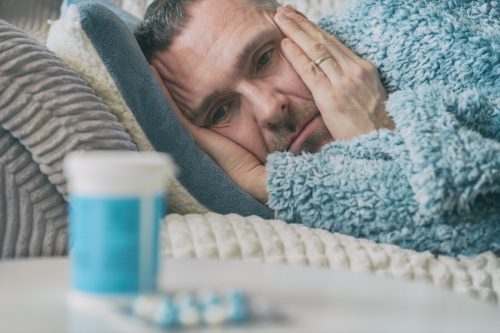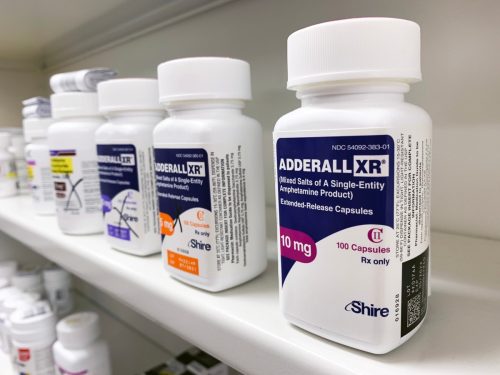4 Popular Medications That Could Be Keeping You Up at Night, According to a Doctor

Anyone who’s cared for an infant, pulled an all-nighter study session, or worked the graveyard shift knows the importance of a good night’s rest. Getting the recommended seven to nine hours of sleep per night is essential for not only feeling well-rested but also for mood, cardiovascular health, brain function, immunity, and appetite. But unfortunately, sleep disorders are on the rise. According to the American Sleep Apnea Association, sleep-related problems affect 50 to 70 million Americans of all ages and socioeconomic classes. The causes of our collective sleep deprivation are numerous, but one reason could be lurking in your medicine cabinet. Read on to find out which popular drugs one doctor says might be interfering with your sleep.
READ THIS NEXT: 5 Signs Your Sleep Medication is Hurting You, Doctors Warn.
1
Antidepressants

Antidepressants are among the most commonly prescribed medications because of their efficacy in treating depression. One of the most popular antidepressants, serotonin reuptake inhibitors (SSRIs), work to combat depression and anxiety by regulating serotonin, known as the “feel good” brain chemical. Unfortunately, though antidepressants like SSRIs work medical wonders and help save lives, they can negatively impact your sleep quality, and even cause insomnia.
“Antidepressants can keep you up at night. Even though it seems counterintuitive, it’s common for antidepressants to cause insomnia,” says Laura Purdy, MD, MBA, and board-certified family physician in Fort Benning, Georgia. “For some people, it can be resolved by taking it in the morning, rather than at bedtime, or perhaps lowering the dose.”
2
ADHD medications

These drugs are frequently prescribed to treat children, adolescents, and adults diagnosed with attention-deficit hyperactivity disorder (ADHD). Popular ADHD medications include Ritalin and Adderall, two stimulant medications that can cause insomnia and sleep disturbances. In a 2021 study published in Frontiers in Psychiatry, researchers looked at the link between ADHD and insomnia and found that nearly 45 percent of adult ADHD patients had insomnia associated with ADHD medications.
“Many people with ADHD prefer taking shorter-acting stimulants or taking them earlier in the day. That way, the medication has time to wear off before bedtime,” explains Purdy. “Ritalin and Adderall are stimulant medications, causing you to have trouble falling and staying asleep.”
3
Benadryl

If you’ve dealt with seasonal allergies before, then you’ve likely used (or at least heard of) Benadryl. Benadryl is an over-the-counter medication brand name for an antihistamine called diphenhydramine. Diphenhydramine is used to relieve symptoms associated with allergies, hay fever, and the common cold, including itchy, watery eyes, sneezing, coughing, and runny nose.
Though diphenhydramine and other histamines tend to make you sleepy and sedated, they don’t improve sleep quality. Benadryl can have the reverse effect and cause insomnia. In addition, this popular medication may even lead to hyperactivity, especially in children. Purdy states, “Some people have an idiopathic response, which means instead of getting tired or sedated, they become more awake and alert and have trouble sleeping. Children are particularly susceptible to this.”
For more health news sent directly to your inbox, sign up for our daily newsletter.
4
Oral steroids

Oral steroids are anti-inflammatory medications that typically come in tablet form. These drugs treat various conditions, including allergies, asthma, eczema, inflammatory bowel disease, and arthritis. While steroids are incredible for resolving many uncomfortable and painful ailments, they can seriously disrupt your sleep. Sleep problems, psychosis, and delirium are commonly reported adverse side effects of corticosteroids (a widely prescribed steroid), according to a 2021 study published in Federal Practitioner.
“Steroids often cause insomnia when taken orally. However, most people do not take steroids for long periods, and the side effects of the steroids resolve when the person stops taking them,” says Purdy.
Best Life offers the most up-to-date information from top experts, new research, and health agencies, but our content is not meant to be a substitute for professional guidance. When it comes to the medication you’re taking or any other health questions you have, always consult your healthcare provider directly.